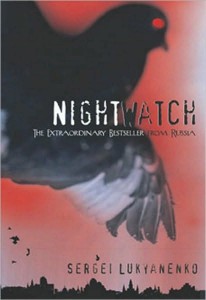 There is a world beyond the everyday one, a world filled with shapeshifters, sorcerers, demons, and more. Collectively, they are the Others, supernatural beings who live among us, and police their own kind with a strict series of checks and balances. The Night Watch, representing the cause of the Light, face off daily against the Day Watch, who keep the forces of the Dark in line. Should one side ever get out of hand, the other is always there to make sure balance is restored, in one fashion or another. And so things have gone for many years. And now, in modern-day Moscow, things are about to get interesting.
There is a world beyond the everyday one, a world filled with shapeshifters, sorcerers, demons, and more. Collectively, they are the Others, supernatural beings who live among us, and police their own kind with a strict series of checks and balances. The Night Watch, representing the cause of the Light, face off daily against the Day Watch, who keep the forces of the Dark in line. Should one side ever get out of hand, the other is always there to make sure balance is restored, in one fashion or another. And so things have gone for many years. And now, in modern-day Moscow, things are about to get interesting.
For Anton, a member of the Night Watch only recently promoted to field agent, it’s the start of something strange and harrowing when he’s sent to deal with a renegade vampire. In fact, the vampire is but the tip of the iceberg, as he quickly stumbles across a young man full of great power, and a beautiful woman threatened by a dark vortex of unimaginable destruction. Anton will have to juggle these twin problems — defuse the vortex before its curse can lay waste to the city, and save the young man from death or corruption. Luckily, he has his allies on the Night Watch to keep him safe . . . or does he? Because someone’s playing a very deadly, complex game, and nothing is what it appears to be.
In the second episode to feature Anton, a member of the Night Watch is being framed for the ritualistic slayings of Others under the Day Watch’s jurisdiction. When Anton himself is revealed as the target, he’s forced to flee justice, and defy both Watches in a desperate attempt to get to the heart of the matter, lest he be sacrificed as a pawn. He’ll cast aside his normal morals and beliefs, and make deals he shouldn’t, all to preserve the balance.
In the final episode, Anton suffers from a world-weary ennui, dissatisfaction and discontent raging in his soul even as a heat wave makes Moscow almost intolerable. He and his friends from the Night Watch leave for a much-deserved vacation in the country, but the time off is exactly what Anton needs to get his thoughts in order. Almost too late, he catches on to a plan of epic nature and drastic consequences, and sets out to interfere with destiny. But will it destroy his career, and his relationships?
Night Watch is the first book in an extremely popular series by Russian SF/F writer Sergei Lukyanenko. Finally translated and made available in English, it’s a stunning example of fantasy written outside the American market. On the surface, it’s fairly standard urban (or cityscape) fantasy: magical beings existing in a society of their own, hidden from public view, dealing with problems unknown to mortal bystanders. No, where this book really takes off is in the setting, the atmosphere, and the attitude.
Night Watch is Russian as only a native can appreciate and understand it, and the mood plays a heavy part throughout the book, affecting everything the characters say or do. It’s easy to see the book’s events play out in Moscow, where characters fight as much with words and bureaucracy as they do with magical spells and claws and fang. When a major plot point can all hinge upon a minor deal made as part of red tape, or checks and balances, or when it all hinges upon how one person words things to another, it just seems to fit perfectly. I’ve described Night Watch as “Simon R. Green, except Russian, introspective, and a lot more melodramatic than over-the-top” and so far, that seems like an accurate designation. The writing style is fluid, carrying the reader along on a wild roller coaster ride from start to finish. And if the (mostly) main character of Anton is prone to overthinking way too much, well, it doesn’t seem out of place here. Night Watch is a novel where immense consequences hinge upon the minor actions of supposedly minor people, and where the most powerful of sorcerers still answer to red tape.
Perhaps if I was better versed in Russian literature, history, and culture, I could more accurately describe how this book possesses a certain style, conveys a specific mood, and represents the Russian style of science fiction/fantasy. Perhaps I would be able to more eloquently note how it’s unlike anything you’re likely to find coming out of the American or British schools of writing. As it stands, I can just say that I was blown away by this glimpse into something different from the same old same. And in the end, isn’t that what many of us are usually looking for? Something familiar, and yet different from the usual. That’s the basis on which I’d recommend Night Watch, and I’ll be looking forward to the rest of the series if and when they make their way over here. Extreme kudos go to translator Andrew Bromfield, who had the unenviable task of translating this book into English without losing its flavor.
